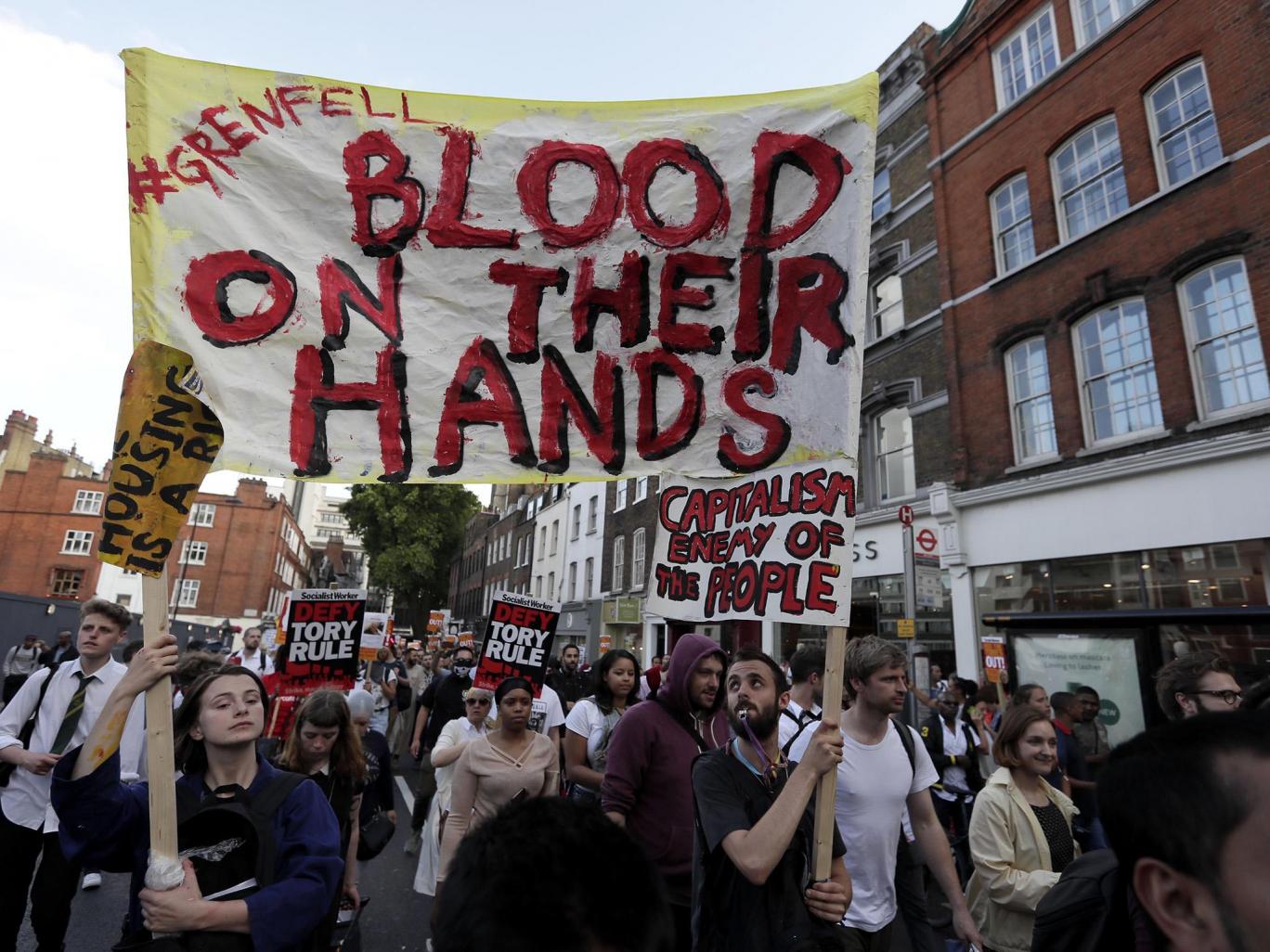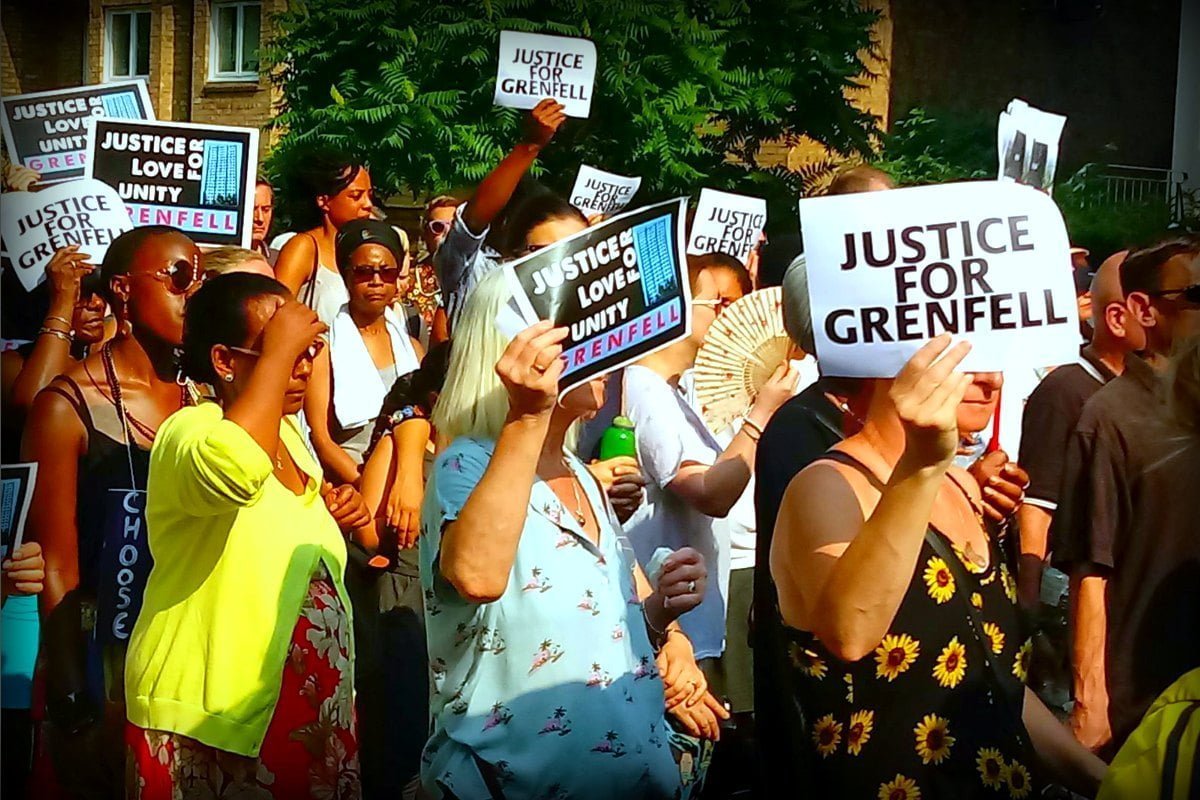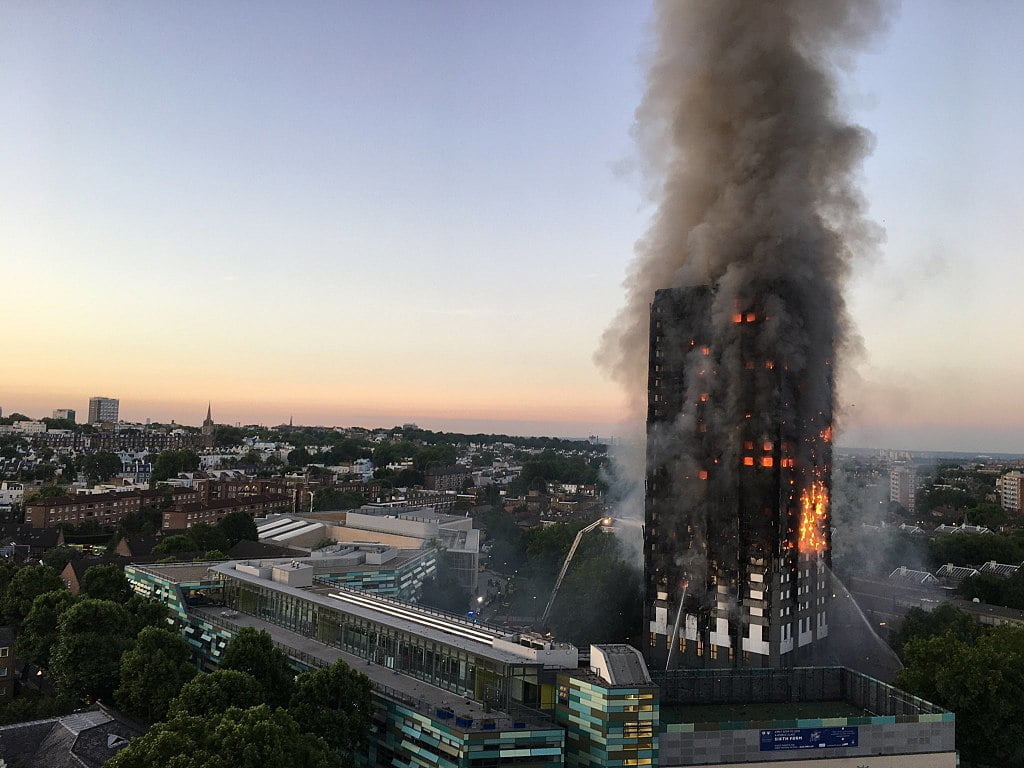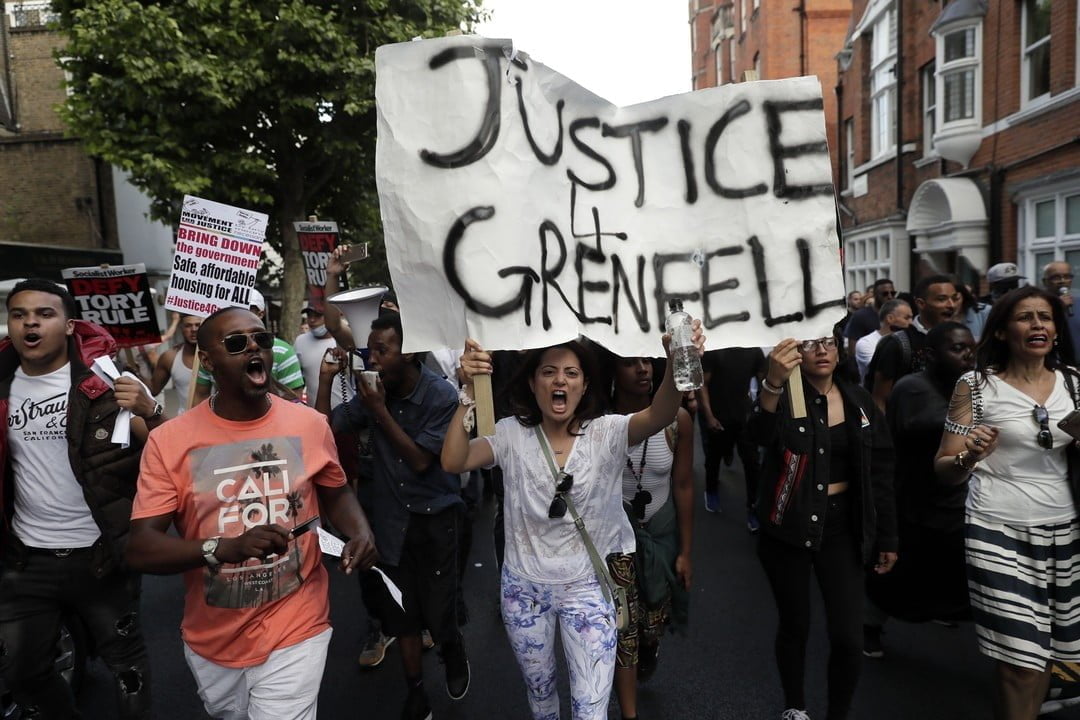The official inquiry into the Grenfell tragedy has begun. But the real criminals are unlikely to ever face justice.
One year on from the avoidable disaster of the Grenfell tower fire, the public inquiry is in full swing.
Headed by Sir Martin Moore-Bick, called on 22nd June 2017, and formally opened on 14th September 2017, the inquiry recently finished its harrowing commemoration hearing phase, with the evidence hearing now underway. During this phase, more than 2,000 pages of reports have been released onto the inquiry website.
The evidence will be mulled over until 29th October, when the inquiry closes. It will focus on 13 specifics, with the idea of making sure this “never happens again”.
Here are just a few of the topics under question: the design of the building; modifications; fire safety measures; inspections; management of the building; communication to residents; response to recommendations; the fire itself; the emergency service response; and the chilling aftermath, which saw residents abandoned by the local authority.
By all accounts, however, given the history of official inquiries and inquests, Grenfell 2.0 is waiting in the wings.
Guilty in hiding
 Originally the mandate for the inquiry was much narrower than that listed above. Sir Martin commented in July 2017, “I’ve been asked to undertake this inquiry on the basis that it would be pretty well limited to the problems surrounding the start of the fire and its rapid development”.
Originally the mandate for the inquiry was much narrower than that listed above. Sir Martin commented in July 2017, “I’ve been asked to undertake this inquiry on the basis that it would be pretty well limited to the problems surrounding the start of the fire and its rapid development”.
The prospect of a limited inquiry led to a public outcry, with the loudest voices from the surrounding community. The Tories, under pressure, were forced to open this case far wider than they had intended. Theresa May back-pedalled several times over how many panel members there would be and what would be discussed. Even then, the terms of reference are still far too constricted.
Now the inquiry’s purpose is to look into – and hopefully lay bare – the failures of the Royal Borough of Kensington and Chelsea (RBKC), the Tenants Management Organisation (TMO), and the refurbishment construction company, Rydon. It is supposed to expose the decision making that led to the murder of 72 victims.
The inquiry has barely begun, however, and already we’ve seen the media blame the valiant firefighters, attempting to deflect blame away from the truly guilty. Take, for example, outlandish writers such as Andrew O’Hagan, who has essentially written a 60,000-word essay (with limited evidence) that reads like a press release or defence statement for the local council.
Moreover, none of the suspected criminals were present for the commemoration phase, to see the turmoil and raw emotion of the victims. The guilty stayed away, hiding.
After all the crocodile tears from capitalists and Tories alike, it was reported that several key figures were absent. James Brokenshire, the housing secretary: absent. Dominic Raab, the housing minister: absent. Nick Hurd, the fire services minister and main government contact for survivors: absent.
The cost-cutting consultants, Artelia, who gave the greenlight for this slaughter; the company who put up the combustible cladding with no remorse, Rydon; and the architects, Studio E, who removed the Grenfell refurbishment details from their website because it showed their guilt: none of these bothered to rear their ugly heads.
No justice on the horizon
 In the long term, this inquiry will offer very little comfort to the former Grenfell residents, the surviving family and friends, or the working class as a whole.
In the long term, this inquiry will offer very little comfort to the former Grenfell residents, the surviving family and friends, or the working class as a whole.
Previous high-profile inquiries – such as the Leveson inquiry into the phone hacking scandal, or those looking into the murder of Stephen Lawrence or the Hillsborough disaster – left us with very specific details, hard facts, and evidence of injustices and miscarriages of law. Chilcot’s 1,000,000 word document highlighted Blair’s imperialist actions in Iraq.
But what have any of these inquiries ever actually achieved concretely in terms of providing justice? In all these cases, there have been no arrests, no charges of criminal behaviour, and no justice.
Hearing the stories of the victims is hugely important, in order to ensure that this murder isn’t lost to the annals of history. However, the painful memorials and sickening reports can’t prevent the ruthless pursuit of profits, which is ultimately responsible for this tragedy. Only a mass movement of the organised working class can ensure this much-needed systematic change.
The Tories cannot even keep the hollow promises that they have already made. So why would they implement any recommendations coming out of this inquiry? Remember when May said the survivors would be rehoused in three weeks? Everyone knows that this hasn’t been done.
The clearest example comes from the story of Luke Pollard, a Labour MP for Plymouth. In his constituency, three tower blocks still have the same cladding as Grenfell. He’s gone to the local authority and to the national government, but has received no support. This comes after ‘assurances’ from May and her allies that this would not be the case.
To the amazement of nobody, across the country only seven tower blocks with unsafe cladding (out of over 300) have seen their dangerous insulation removed. And to rub salt into the wound, the budget set for decladding is coming out of the Affordable Housing Programme, meaning even less affordable housing will be built, when we are already facing a housing crisis. Meanwhile, Sajid Javid has returned £1.1 billion of unspent funds from the housing budget in two years alone.
It is hard to get across how disgusting these actions are. The Tories and their big business friends burn the working class to death in their homes whilst luxury flats stand empty less than a mile away.
Lessons not learnt
Grenfell victims and campaigners have reason to be skeptical about the prospect of justice being served. In 2009 there was an inquest into the fire at Lakanal House, in Camberwell, London, which left six dead. Key recommendations were made to make sure “this never happens again”. And yet here we are.
If the recommendations of the Lakanal inquest had been implemented, working-class families need not have been torn apart by the Grenfell tragedy.
Even as far back as 2007, Rockwool, a non-plastic insulation company, sent out video evidence that the cladding on the outside of Grenfell tower was combustible, only to see themselves sued for ‘malicious falsehoods’.
Celotex, the manufacturer of the cladding in question, sat on the Department for Energy and Climate Change (DECC) committee regarding insulation. On their now deleted webpage they boasted that “Celotex enters government…[to] shape critical policy enabling the insulation industry to maximise the benefits”. They were involved in the suing of Rockwool. And to make matters worse, between 2012-16 when the DECC insulation committee met, cost and saving were always mentioned, but never fire safety.
This is the nature of capitalism. Even if it examines all the failures in depth – from the lack of regulation to manufacturer faults – capitalism will always demand ways to make profit easier. In time, so long as the system is geared towards private property and profit, any recommendations will be swallowed up or overturned.
To prove the point: whilst the local community suffers, with Grenfell’s victims moved from one temporary accommodation to another, Rydon’s profits have increased by approximately 50% in the last year alone. Their highest paid director now sits pretty on £459,000 per year, following an 8% pay increase.
Warnings ignored
 Long before the tragedy occurred, the Grenfell Action Group, spearheaded by Eddie Daffarn, warned about the dangers awaiting them, with no less than 10 blog posts specifically about fire safety, going as far back as 2013.
Long before the tragedy occurred, the Grenfell Action Group, spearheaded by Eddie Daffarn, warned about the dangers awaiting them, with no less than 10 blog posts specifically about fire safety, going as far back as 2013.
In one ominous prediction, the group’s stated that they had “reached the conclusion that only an incident that results in serious loss of life of KCTMO [Kensington and Chelsea Tenant Management Organisation] residents will allow the external scrutiny to occur”.
Had these blogs not been written, would the ruling class have tried instead to treat this disaster as nothing more that an ‘accident’ that ‘just happened’? We suspect so, given their callousness.
On 21st May, Eddie gave his first in-depth interview and spoke of how the RBKC councillors dubbed him, along with others in the group, a “fantasist” and a “nuisance”. He said that, with their blogs posts, the Grenfell Action Group:
“…wanted to record for history how in the 21st century, in the 5th richest country in the world, a community could be so abused, so marginalised and so not listened to…
“We wanted future generations to look back and see how that was possible…we were the carcass and they were the vultures.”
Two more activists who perished in the fires – but who live on through their tireless work – were also personally labelled “troublemakers”.
There was Nadia Choucair, then a mother of three, whose family gave a moving testimony during the second day of the memorials. Her brother Hisam agonisingly pronounced that, “I don’t see this as a tragedy, I see it as an atrocity, because essentially there is segregation between the rich and the poor…My family should still be here.”
And there was Mariem Elgwahry, remembered on day six of the inquiry for how she selflessly attempted to keep her mum calm and spare her brother’s feelings in her final phone call.
Both Choucair and Elgwahry were threatened with legal action for speaking out. Both were bullied and intimidated after bravely calling a protest outside the TMO’s offices and launching a petition for improvements that 90% of tenants signed.
More than a disaster
Frederick Engels accurately described the situation facing working-class communities in his essays on the Conditions of the Working Class in England:
“When society places hundreds of proletarians in such a position that they inevitably meet a too early and an unnatural death, one which is quite as much a death by violence as that by the sword or bullet; when it deprives thousands of the necessaries of life, places them under conditions in which they cannot live – forces them, through the strong arm of the law, to remain in such conditions until that death ensues which is the inevitable consequence – knows that these thousands of victims must perish, and yet permits these conditions to remain, its deed is murder”
Grenfell is a symbol of our time. It highlights the alienation that working-class communities face on a daily basis. As Simon Jenkins stated in the Evening Standard: “The [Grenfell] event has gone beyond the status of a disaster, beyond a tragedy of fire safety or construction failure or housing policy.”
It is task of all of us to make sure that the Grenfell victims aren’t forgotten or betrayed. I won’t forgot what I saw, working in the St Mary’s hospital A&E in Paddington on the night of the fire. And we as a class will never forget. The story is imprinted on our collective memory.
The only solution is socialism: nationalising the building companies, ousting the parasites, and kicking out the Tories. Without this radical change, we will end up writing these same words again on the second anniversary of the Grenfell fire, or repeating them the next time capitalism’s drive for profits leads to the brutal massacre of innocent working-class victims.






